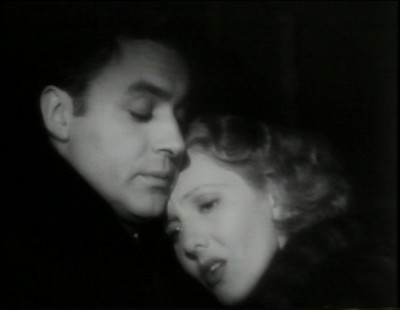
Frank Borzage’s History Is Made at Night (1937) is a perfect fit for Valentine’s Day. It has been said, after all, that this film has the most romantic title of all time. Whether you agree with that or not, I suspect you’ll find the film irresistible. It’s the sort of story that only Borzage—who made 7th Heaven (1927)—could bring to the screen. The story involves Irene Vail (a luminous Jean Arthur), a woman with an insanely jealous husband (Colin Clive) who is so obsessed with fighting her attempt at divorcing him that he pays her chauffeur to put her in a compromising position in order to invalidate the final decree. But the plan goes awry when Paul Dumond (Charles Boyer) overhears what’s going on and poses as a jewel thief in order to keep her from being compromised. What follows defies description, but it involves romance, comedy, murder, blackmail and a touch of the Titanic. It ought not to work, but somehow it does. Borzage and his cast manage to move through the film’s extreme tonal changes in a way that makes it all seem perfectly natural and fluid. And if, as has been said, Borzage’s movies are about “souls made great through love and adversity,” Arthur and Boyer are in that select group of souls.

Like many films made under the banner of independent producer Walter Wanger, History Is Made at Night has tended to drift into obscurity. (In fact, the only commercially produced DVD of the film is from Brazil.) The only reason I saw it originally was courtesy of a dying UHF channel out of St. Petersburg, Florida that specialized in showing whatever it had on hand that was cheap. I’m not sure at this distance even why I tuned in, because I was quite young and the title meant nothing to me. My guess was that it had to do with the stars or the fact that it was from the 1930s, which I’d discovered early on tended to be to my liking. The one thing I clearly remember was that whatever I expected, this wasn’t it. I’d never seen anything quite like it. Now I know that it’s because there simply isn’t anything quite like it.

The movie starts on a note of pure melodrama, concerning Bruce Vail (Clive) and his monomaniacal efforts to keep Irene from getting her divorce decree. The business of her encounter with Paul stepping in to protect her honor by posing as a thief is probably the single oddest and most convoluted example of “meeting cute” in the entire history of the movies. And it’s from this that the film effortlessly slips into the realm of romance—with a lightness of touch that is only found in the movies. In fact, the whole set-up of turning from her being his supposed kidnap victim to being his guest for the evening veers toward romantic comedy, especially when Paul softsoaps a restaurant (where he’s the head waiter) and its orchestra into staying late just for the two of them. From there, the events become giddy—yet touched with desperation—in their sheer romanticism.
It is also at this point where History Is Made at Night starts becoming inexplicably magical—and from a criticism standpoint, somewhat frustratingly so. The problem, you see, is that what happens is virtually impossible to describe. You can take the individual components and break them down, but it gets you nowhere. In fact, it presents a wholly false idea, because the sum of the film is so much greater than its parts suggest. For that matter, you would probably conclude that the whole contraption ought not work at all, but it does. It even works when it arrives at its climactic stretch, which taken on its own merits should be risible, but it isn’t.

It’s possible to make some tentative stabs at the whole thing hinging on the appeal of its romantic leads, the charms of Leo Carillo’s comic sidekick, or even the villainy of Colin Clive (visibly worn and tormented, making it no surprise that he died later that year at the age of 37). That definitely enters into the equation, as does the simple (or maybe not so simple) fact that Arthur and Boyer take their roles—both the light and heavy parts—with complete conviction. But these things don’t tell the whole story, which is somehow grounded in the greatness of Borzage, who—when the occasion presented itself as it does here—seemed to be able to see into the very souls of his characters, making them transcend even the most improbable material. Perhaps the only filmmaker to equal him in this regard was Josef von Sternberg, but Borzage has none of Sternberg’s cynicism, making him simply not like anyone else.




Before you comment
The comments section is here to provide a platform for civil dialogue on the issues we face together as a local community. Xpress is committed to offering this platform for all voices, but when the tone of the discussion gets nasty or strays off topic, we believe many people choose not to participate. Xpress editors are determined to moderate comments to ensure a constructive interchange is maintained. All comments judged not to be in keeping with the spirit of civil discourse will be removed and repeat violators will be banned. See here for our terms of service. Thank you for being part of this effort to promote respectful discussion.